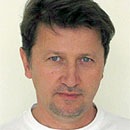Academic Editors
The following people constitute the Editorial Board of Academic Editors for PeerJ. These active academics are the Editors who seek peer reviewers, evaluate their responses, and make editorial decisions on each submission to the journal. Learn more about becoming an Editor.

Joselito P. Quirino
Joselito P. Quirino graduated BSc in Industrial Pharmacy from the University of the Philippines Manila in 1992. He finished his MSc/PhD in Analytical Chemistry with Prof. Shigeru Terabe at the Himeji Institute of Technology Japan in 1998/1999. He was then a postdoctoral researcher in Prof. Richard Zare’s laboratory at Stanford University USA until 2001. This was followed by an industrial stint in pharmaceutical companies in California USA until 2007. He went back to academia at the ACROSS in the University of Tasmania where he is currently an Associate Professor. He has been awarded an Australian Research Council Future Fellowship and Japanese Society for the Promotion of Science Fellowships.

Elisabetta Ada Cavalcanti-Adam
E. Ada Cavalcanti-Adam is a research group leader at the Institute of Physical Chemistry, University of Heidelberg and head of Central Scientific Facility “Biomaterials and Molecular Biology” at the Max Planck Institute for Intelligent Systems in Stuttgart. Her main research interest is on extracellular stimuli which guide cell structure and functions with a special focus on the role of growth factors on cell adhesion and migration.

Frederick E. Lepore
Professor of Neurology and Ophthalmology at UMDNJ/RWJMS; Designer: Optic Nerve Test Card. Honors: Fellow American Academy of Neurology; member American Neurological Association, Who's Who in America.

Maria Miragaia
Auxiliary Researcher at Laboratory of Bacterial Evolution and Molecular Epidemiology, Instituto de Tecnologia Quimica e Biologica, Universidade Nova de Lisboa, Portugal. Recipient of the 2010 European Society of Clinical Microbiology and Infectious Diseases (ESCMID) Grant and of the Interscience Conference on Antimicrobial Agents and Chemotherapy (ICAAC) Infectious Diseases fellows Award.

Jiri Vondrasek
Head of Bioinformatics Department at Institute of Organic Chemistry and Biochemistry, Academy of Sciences of the Czech republic, lecturer at faculty of natural sciences, Charles University - Prague, vice president of the Czech Bioinformatics Association and national coordinator of the European infrastructure for biological data - ELIXIR.

Beth Polidoro
Beth Polidoro is an Associate Professor of Environmental Chemistry and Marine Conservation, as well as serving as the Deputy Director for the Center for Biodiversity Outcomes at Arizona State University. Her primary research interests are in risk assessment and applied toxicology within the context of marine and freshwater biodiversity conservation, human health, and sustainable development. Dr. Polidoro has a broad background in the marine, chemical and environmental sciences. Before to coming to Arizona State University, she was a senior research associate with the International Union for the Conservation of Nature (IUCN), where she worked with scientists around the globe to quantify the impacts of anthropogenic threats on more than 20,000 marine species, for inclusion on the IUCN Red List of Threatened Species. She currently works on various marine and freshwater conservation initiatives and both ecological and human health risk assessments in the United States, Latin America, Africa and Oceania.

Florentine Marx
Associate Professor at the Medical University of Innsbruck. We are interested in the mechanistic function and structure of antimicrobial/antifungal proteins and peptides and the identification of target molecules for the development of new antimicrobial/antifungal therapies.

Kathryn A Gold
Associate Professor, Thoracic/Head and Neck Medical Oncology, Moores Cancer Center, University of California San Diego

Zoltán Tóth
My current research focuses on investigating whether or not the utilization of social information is taxonomically widespread, beneficial in different ecological conditions, and independent of permanent group-living similarly to the exploitation of other biotic or abiotic cues in the environment. I use several model systems to test related predictions in the contexts of foraging and predator avoidance, and build individual-based models to investigate how social information-mediated behavioural adjustments may affect population dynamics and species interactions.

Lydia Jimenez-Diaz
Principal investigator of several projects at international, national and regional level, and has participated in over 20 research projects as a partner. Currently co-director of two doctoral courses on the brain regions associated with memory storage and Alzheimer's disease. Research is focused on the molecular and cellular basis of synaptic plasticity processes in the Central Nervous System.

Juliana Schietti
I am a plant ecologist and my interests include forest structure and dynamics, species diversity, plant traits and relationships with environmental gradients. I am an Ecology professor and researcher at the Federal University of Amazonas (UFAM) and an associate researcher at the National Institute for Amazonia Research (INPA) in Manaus, Brazil.

Jeroen AA Demmers
Team leader Proteomics Center & Assistant Professor Erasmus University Medical Center Rotterdam
Education:
EUR Fellow, Erasmus University Medical Center
Postdoc, The Rockefeller University (Chait lab)
PhD, Utrecht University (Heck & Killian labs)
MSc (hons) Chemistry, Utrecht University

